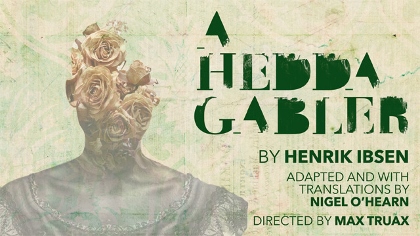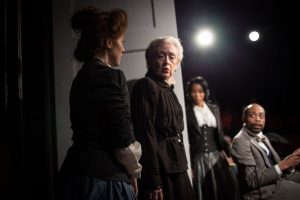A JEALOUS WIFE WITH BAD GUN CONTROL
You can’t keep a bad/mad woman down. Not to be confused with A Doll’s House, where Ibsen offers an almost feminist defense of a vastly underestimated wife, his poisonous 1891 domestic drama Hedda Gabler depicts a very different “helpmate.” Here a bored and bitter housewife transforms her contempt for her scholar-husband into domestic tragedy. Based on a spare 110-minute translation and one-act adaptation by Chicago playwright Nigel O’Hearn, Red Tape Theatre’s terse new version, A Hedda Gabler, directed by the always resourceful Max Truax (who also staged Ibsen’s Brand for Red Tape), ponders and probes the title character like a living autopsy.
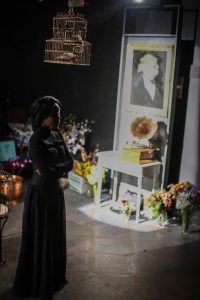 Aayisha Humphrey plays the seething, vengeful title character, a disturbed individual who, from one perspective, is a vibrant human being who loves and suffers and makes choices from her limited options as a woman. From another viewpoint, Hedda is a spiteful narcissist, the pampered daughter of General Gabler and a control freak who, not getting the man she wants, will destroy her ex-lover’s work and more.
Aayisha Humphrey plays the seething, vengeful title character, a disturbed individual who, from one perspective, is a vibrant human being who loves and suffers and makes choices from her limited options as a woman. From another viewpoint, Hedda is a spiteful narcissist, the pampered daughter of General Gabler and a control freak who, not getting the man she wants, will destroy her ex-lover’s work and more.
In a prologue dumbshow we see Hedda compulsively ordering her elderly maid Berte (Barbara Button) to place and replace faded flower arrangements in various parts of the parlor. When angry, she scratches the wall in displaced fury. At times she paces with a passion or bursts into a dance of delirium before her gramophone (that anachronistically plays the Walt Disney favorite “A Dream Is a Wish Your Heart Makes”).
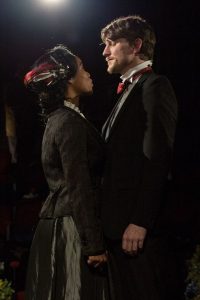 These are heavy clues to the troubled innards of the pistol-packing lady of the house, recovering badly from an unedifying honeymoon with George Tesman (Johnard Washington), her stultifyingly academic husband.
These are heavy clues to the troubled innards of the pistol-packing lady of the house, recovering badly from an unedifying honeymoon with George Tesman (Johnard Washington), her stultifyingly academic husband.
The others in this hothouse household only aggravate Hedda’s sense of unappeasable grievance and unearned entitlement. Proprietary and predatory, Judge Brack (Michael Kingston) craves Hedda: He won’t stoop at blackmail to own her. Her school chum Thea Elvsted (Sarah Grant) enrages Hedda for having left Thea’s husband in order to assist and adore Hedda’s lost love Eilert Lovborg (Austin Oie). He’s a brilliant writer on the verge of success but, when in his cups, a dangerous alcoholic and womanizer. At one point Hedda and Thea freeze into a curious marionette-like tableau vivant, another expressionistic stage picture from a not so subtle director.
These contretemps are all the ingredients that Ibsen needs to drive Hedda into her own personal (and also public) hell, raging against the supposed cowards who surround her. Or that Truax requires to expose Hedda in full fester, even at the risk of courting melodramatic overkill.
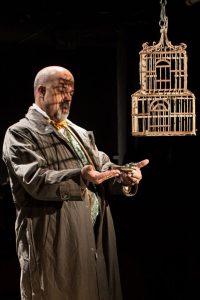 The small stage and Andrew Lekmkuhl’s pitiless lighting effects put all six characters under a vicious glare. As much as theater can open up a character’s inner workings, we sense the demons Hedda can barely constrain as she writhes against invisible chains. Every action she takes only tightens them more. Her rigid world won’t bend but it will break her.
The small stage and Andrew Lekmkuhl’s pitiless lighting effects put all six characters under a vicious glare. As much as theater can open up a character’s inner workings, we sense the demons Hedda can barely constrain as she writhes against invisible chains. Every action she takes only tightens them more. Her rigid world won’t bend but it will break her.
Before it’s over Humphrey’s Hedda snaps so many times she’s her own percussion section, snarling threats, hiding nothing in her outsized reactions, and projecting in all directions Hedda’s self-defeating drive for power. It’s not pretty but, happily, it’s not long. O’Hearn’s condensation serves Ibsen’s intentions well, tightening the noose around Hedda more efficiently than the original play’s dovetailing crises.
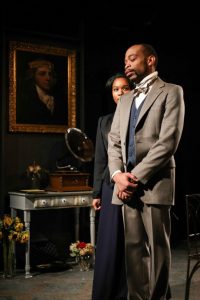 Washington’s George is pathetically hapless in his clueless miss-take on Hedda’s driving depression. Grant’s hopeful, buoyant Thea is tailor-made to incite Hedda’s destructive urges. Oie’s faint-hearted Lovborg seems the perfect victim to get “gabblered” up. Kingston’s patriarchal pomposity’”and the unromantic tidings he delivers’”are the final goads for Hedda’s last desperate act.
Washington’s George is pathetically hapless in his clueless miss-take on Hedda’s driving depression. Grant’s hopeful, buoyant Thea is tailor-made to incite Hedda’s destructive urges. Oie’s faint-hearted Lovborg seems the perfect victim to get “gabblered” up. Kingston’s patriarchal pomposity’”and the unromantic tidings he delivers’”are the final goads for Hedda’s last desperate act.
A Hedda Gabler honors Ibsen’s lacerating depiction of a lonely, losing lady. Whatever sympathy for the devil that O’Hearn and Truax feel for their title character seems nicely placed.
photos by Austin Oie
poster image by Bridget Schultz
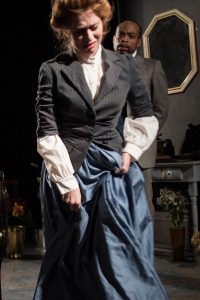 A Hedda Gabler
A Hedda Gabler
Red Tape Theater
Pride Arts Center, 4147 N Broadway
Thurs-Mon at 8
ends on December 17, 2016
for tickets, visit Red Tape
